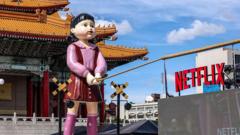As lovebugs invade Seoul, municipal workers take a gentle approach, while residents demand stronger action against the insects that have become a summer nuisance.
Seoul's Lovebug Dilemma: A Battle of Public Opinion

Seoul's Lovebug Dilemma: A Battle of Public Opinion
Residents express frustration as harmless lovebugs swarm the South Korean capital, prompting calls for harsher control measures.
In an unexpected turn of events, the summer of 2025 has brought forth an infestation of lovebugs to Seoul and its surrounding cities, shocking residents who are less than thrilled about the uninvited guests. Officially designated as harmless insects, lovebugs, characterized by their distinct mating pairs, have become an unwelcome sight for many who traverse the streets of the South Korean capital.
The invasion began last month and is projected to dissipate by the upcoming weekend. Despite their non-threatening nature towards human health, the city officials have adopted a surprisingly lenient strategy in dealing with the lovebug swarms by primarily using water sprays. In a bid to foster environmental awareness, the Seoul government has circulated messages encouraging residents to avoid pesticides, claiming that “lovebugs are not pests.”
However, this environmental stance is met with increasing dissatisfaction from the public, who find the bugs to be a nuisance rather than a harmless phenomenon. Various reports indicate that calls for more aggressive pest control measures are on the rise, with locals feeling overwhelmed as they contend with the swarms threatening their outdoor experiences.
In Incheon, a neighboring city also grappling with the infestation, local business owner Ahn Yeon-sik voiced the collective frustration, stating, “There's nothing beneficial about them.” He is not alone; witnesses have described various scenes of avoidance and makeshift bug-swatting as pedestrians navigate through the pesky swarms, trying to shield themselves from unintended encounters with the lovebugs.
As Seoul's municipal workers douse lovebugs with water as part of their non-lethal strategy, the frustration of residents continues to mount, reflecting a broader conversation about balancing pest control and environmental concerns in urban planning. While officials urge citizens to safeguard nature, an uneasy compromise looms as the city braces for the potential summer of the lovebugs.
The invasion began last month and is projected to dissipate by the upcoming weekend. Despite their non-threatening nature towards human health, the city officials have adopted a surprisingly lenient strategy in dealing with the lovebug swarms by primarily using water sprays. In a bid to foster environmental awareness, the Seoul government has circulated messages encouraging residents to avoid pesticides, claiming that “lovebugs are not pests.”
However, this environmental stance is met with increasing dissatisfaction from the public, who find the bugs to be a nuisance rather than a harmless phenomenon. Various reports indicate that calls for more aggressive pest control measures are on the rise, with locals feeling overwhelmed as they contend with the swarms threatening their outdoor experiences.
In Incheon, a neighboring city also grappling with the infestation, local business owner Ahn Yeon-sik voiced the collective frustration, stating, “There's nothing beneficial about them.” He is not alone; witnesses have described various scenes of avoidance and makeshift bug-swatting as pedestrians navigate through the pesky swarms, trying to shield themselves from unintended encounters with the lovebugs.
As Seoul's municipal workers douse lovebugs with water as part of their non-lethal strategy, the frustration of residents continues to mount, reflecting a broader conversation about balancing pest control and environmental concerns in urban planning. While officials urge citizens to safeguard nature, an uneasy compromise looms as the city braces for the potential summer of the lovebugs.























